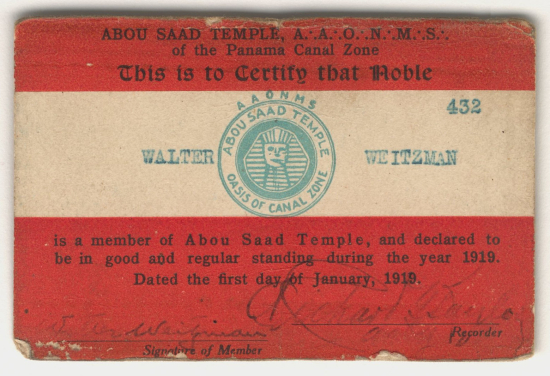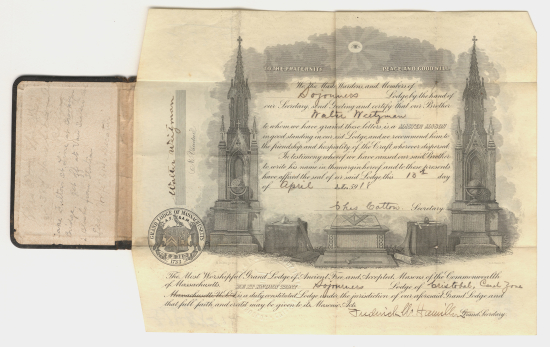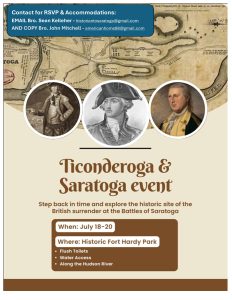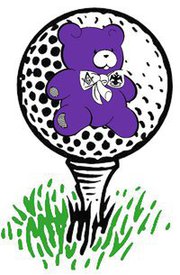The Scottish Rite Masonic Museum & Library recently acquired a group of Masonic membership cards and certificates that help tell the story of American Freemasonry in the Panama Canal Zone during the era of American imperialism in the early twentieth century. Thank you to Archivist Sarah Shepherd and the rest of the staff at the Museum for their work on this and many other articles!
After the Spanish-American War in 1898, the United States became a global empire claiming dominion over Puerto Rico, Guam, Hawaii, and the Philippines, and continued to conquer additional territories into the early twentieth century. U.S. soldiers were shipped to these territories to maintain control and with them spread American Freemasonry. Walter Weitzman (1892-1989) was one of these soldiers, stationed in the U.S. Panama Canal Zone in 1914, to protect the newly opened Panama Canal which connects the Atlantic and Pacific Ocean. Weitzman, a Polish Jew who immigrated to the U.S. in 1909 or 1910, joined the U.S. Army at age twenty-two—several months before the start of World War I. He served in the Coastal Artillery Corps at Fort Randolph in the Panama Canal Zone until 1920.
Freemasonry was a part of the social lives of both the workers constructing the Panama Canal, as well as American soldiers stationed there. Masons in Panama saw Freemasonry as an integral part of life in the Panama Canal Zone. In 1910, the Masonic Advisory Board of the Isthmus of Panama declared that Masonic membership “permeates the entire personnel of this vast enterprise and beneath the sod of the Isthmus, many of our Brothers who have died in the service, are resting. The brethren meet one another from every clime, and as the great work continues, so let Brotherly [work] continue.”
Initially Masonic clubs flourished as it was difficult to form lodges because Masons in Panama continued to belong to lodges on the mainland during their temporary stay. The first lodge, Sojourners Lodge, no. 874, was founded in 1874, under the Grand Lodge of Scotland. When the United States took over the Panama Canal, the membership became predominantly American and in 1912, a new Sojourners Lodge was chartered under the Grand Lodge of Massachusetts.
In 1917, the District Grand Lodge of Panama recorded membership at 902 with 141 new initiates and 78 applicants were rejected. Walter Weitzman, an American soldier, a Polish Jew newly immigrated to the United States, standing 5 feet and 4 ½ inches tall, with dark gray eyes and dark hair, was one of the new applicants. He was initiated into Sojourners Lodge on December 15, 1917. Weitzman paid an application fee of ten dollars in October and a forty-five-dollar initiation fee in December—a significant amount, considering that his salary was around thirty dollars a month. Weitzman was raised a Master Mason on February 23, 1918.
After joining Sojourners Lodge, Weitzman became a Scottish Rite Mason in the Panama Canal Consistory No. 1 in the Valley of Cristobal in the Canal Zone. His dues were six dollars a year. Weitzman also became a Noble of the Mystic Shrine of the Abou Saad Temple on November 30, 1918. He was one of the first members as the Abou Saad Temple in Panama was established in 1918 and still exists today.
Weitzman was honorably discharged from the U.S. Army in 1920 after his regiment was disbanded. He continued to be a member of Sojourners Lodge and a part of the Panama Canal Consistory No. 1 until 1925. In New York, Weitzman became involved in other fraternal organizations such as the Independent Order of Odd Fellows where he was elected Noble Grand of the Norman A. Manning Lodge, No. 415, in Brooklyn, New York in 1927. His association with Freemasonry appears to have ended about a decade after he was discharged from the Army. According to the Grand Lodge of Massachusetts records, Weitzman was suspended on September 1, 1931, likely for not paying dues.
Weitzman lived in the Bronx, New York for several decades with his wife, Anna Lerman, and their two sons until his death on January 30, 1989. The Walter Weitzman Panama Canal Zone Masonic collection, 1917-1925, now resides at the Scottish Rite Masonic Museum & Library.
To read more articles from the Museum & Library, click the link below!






